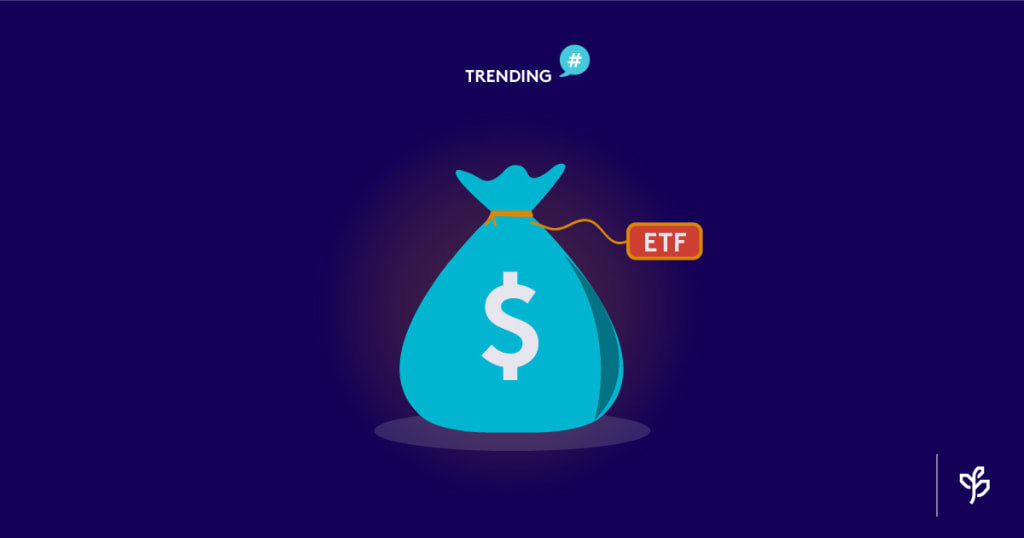Why Are ETFs a Great Investment Alternative
Exchange-Traded Funds are investment funds which can be traded like stocks. Why have they become so popular as of late?

An Exchange-Traded Fund (ETF) is a bundle of securities — stocks, bonds, commodities or a combination of these — that you can buy and sell through a broker, just like a stock.
Now, they may be small by name but they’re big news on the investing scene. Last year alone, the total amount of money invested in US-based ETFs increased 34%, showing that investors are favoring Exchange-Traded Funds over other investment vehicles, such as mutual funds.
In fact, according to a recent study by Charles Schwab Corporation:
- 60% of millennial investors plan to increase their investments in ETFs over the next year.
- 56% of millennials who have invested in ETFs say they are their ‘primary investment vehicle.
The nitty-gritty of ETFs
ETFs usually track an index. For example, you can invest in an ETF that tracks the S&P 500 or the DJIA, which are indexes closely watched as a benchmark indicator of the US economy’s health.
You can also invest in sector-specific ETFs, which contain stocks of companies in particular industries, including technology, utilities and environmental sustainability.
ETFs are like index funds, but with a twist. They’re publicly traded throughout the day like stocks on an exchange (e.g. NYSE or NASDAQ), with their prices based on supply and demand. Traditional index funds, on the other hand, are priced and traded at the end of each trading day.
Why are ETFs so popular?
The good reputation of Exchange-Traded Funds is increasing because of some of the features that make them a great investment option. Here is a list of their best qualities:
Cost efficient
ETFs usually have lower fees than mutual funds. Instead of leaving the costs to be handled by the mutual fund company, they are managed by the broker, alongside all customer relationships.
Besides, you don’t need to pay commissions to buy all the securities in the portfolio, as Exchange-Traded Funds enable the capability of acquiring a diversified portfolio for one single commission.
Better diversification
Investing in Exchange-Traded Funds gives the investor a well diversified portfolio with lower variability than investments in individual securities. This is because funds that track an index will incorporate all the securities that are included in it, getting a good amount of information about what is happening in the market.
Keep in mind that even they are helpful, just spending your money in several ETFs doesn’t assure an appropriate diversification. You will still have to deal with systematic risk.
Instant liquidity
Investors can keep buying and selling Exchange-Traded Funds during trading hours, as they are traded on stock exchanges. This is a great advantage of ETFs, specially when markets are volatile, because there is no need to wait to the end of the day like when trading mutual funds.
Permanent transparency
You can feel very secure when you invest your money in Exchange-Traded Funds. You will always know exactly what you are investing in as index ETFs hold the same securities as their tracked indexes.
At the other hand, in the case you invested in a fund that isn’t tracking an index, you can also trust its transparency because it will publish its full portfolio every single day.
ETFs, mutual funds, and stocks
ETFs offer the best of these popular assets. They have the diversification benefits of mutual funds while being traded just like stocks.
Instead of investing in just one stock, leaving us vulnerable to market swings, Exchange-Traded Funds offer hundreds at once, providing broad diversification, often for a lower price and lower fees than mutual funds.
Additionally, ETFs are considered more tax efficient than mutual funds because they don’t need to be managed as often as mutual funds, for example the buying and selling of securities to make capital gains.
The takeaway
Investors are flocking towards ETFs because of their simplicity, relatively low prices and diversification. Generally speaking, their low-maintenance style means lower costs or lower expense ratios than other types of funds.
Keep in mind that even if the diversification aspect of ETFs diminishes some risk, they can still be risky, especially if choosing a sector-specific ETF.
More from FlexInvest
- What are the benefits of ETFs
- The Market Cap can help you make wiser investments
- 5 key money saving tips to take advantage of extra cash
About the Creator
FlexInvest
Investing and finance made simple.






Comments
There are no comments for this story
Be the first to respond and start the conversation.